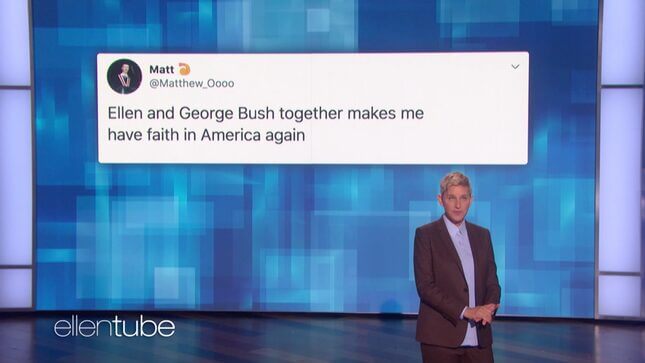George W. Bush Is Not Your Fucking Grandpa
Latest

After Ellen DeGeneres was spotted socializing with former President George W. Bush at a Dallas Cowboys game on Sunday, a slew of critics had a few important reminders about the optics of normalizing the 43rd president. Namely, that Bush is a president who led the country to war on a false premise, left poor black communities in New Orleans to drown, and more or less prepared the political and cultural soils for the Republican Party that would give us the Trump administration.
DeGeneres has, in the days since, attempted to turn this controversy into a half-baked meditation on acceptance, using her Ellen monologue Tuesday to say that she and Bush are friends, and that their friendship is a testament to the value of kindness. (Effectively taking a dump on my prized Rock Against Bush CDs compilations, volumes one and two, in the process.) But DeGeneres’s kindness to someone who, under reasonable circumstances, could be tried for war crimes, isn’t practicing compassion—it’s rich people schmoozing with other rich people they think are slightly ideologically different from themselves and calling it a model of friendship. While this socializing may seem harmless, it’s actually part of a broader narrative that’s helped Bush regain some semblance of power and nostalgia in the years since he stepped down.
On her show, DeGeneres explained that she and her wife Portia de Rossi were invited to the game by Charlotte Jones, the daughter of Cowboys owner Jerry Jones. They accepted the invitation and were placed in what DeGeneres described as a “very fancy suite” with very fancy people—fancy people like Bush and former first lady Laura.
“During the game, they showed a shot of me and George laughing together, and so people were upset,” she continued. “They thought, Why is a gay Hollywood liberal sitting next to a conservative Republican president?”
-

-

-

-

-

-

-

-

-

-

-

-

-

-

-

-

-

-

-

-

-

-

-

-

-

-

-

-

-

-

-

-

-

-

-

-

-

-

-

-








































